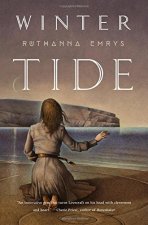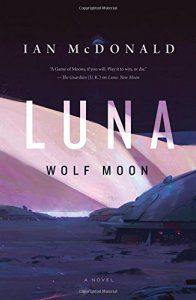Discomfort Reading by Tim Pratt
 I didn’t read much new SF and fantasy this year. I spent a lot of time being anxious for reasons outside the scope of this essay (cough politics cough), and in times like that, I tend to revisit old beloved books, so I spent some time returning to works by Connie Willis, and Terry Pratchett, and Joe Abercrombie (I know, Lord Grimdark might seem an odd choice for comfort reading, but I like what I like).
I didn’t read much new SF and fantasy this year. I spent a lot of time being anxious for reasons outside the scope of this essay (cough politics cough), and in times like that, I tend to revisit old beloved books, so I spent some time returning to works by Connie Willis, and Terry Pratchett, and Joe Abercrombie (I know, Lord Grimdark might seem an odd choice for comfort reading, but I like what I like).
I didn’t entirely hide myself in the past, though, and I read several things worth noting here. I continue to have great affection for stories that engage with the Lovecraft Mythos, especially those that don’t shy away from the ugly parts of his oeuvre, and instead seek to celebrate what’s worthwhile and critique what’s not. Nothing I read this year impressed me as much as LaValle’s Ballad of Black Tom or Mamatas’s I Am Providence from last year, but I still found much to admire. Winter Tide by Ruthanna Emrys firmly engaged with the racism implicit in stories about Innsmouth, recasting the denizens of that village not as the half-fish-half-human offspring of sea monsters, but as a separate, amphibious branch of the human race. Emrys’s narrator, one of the few survivors of Innsmouth after the government razed the city and imprisoned the inhabitants, attempts to reclaim her heritage while wrestling with the racism, sexism, and elitism of 1950s academia, with a healthy dash of Cold War paranoia. It moved a bit slowly, but the characters engaged me, and I have great sympathy with its ambitions.
Meddling Kids by Edgar Cantero is rather faster paced (if less ambitious), and engages with the Mythos in a more superficial way, though there are some nice references to Robert E. Howard and other legends of the pulps. The three surviving members of the Blyton Summer Detective Club (the gang from Scooby-Doo, more or less, with some other boy- and girl-detective tropes swirled in) are all grown up now, all failures in various ways, and haunted by unanswered questions about their last case – they unmasked the swindler pretending to be a lake monster, but weren’t there also real lake monsters, and hints of an ancient god? Now in their twenties, they reconvene (with the maybe-ghost, maybe-hallucination of their deceased leader, and the descendant of their original dog) to return to the scene of the crime, with cataclysmic results. It’s a little too zany and madcap at times (even granting that a degree of silliness is required by the premise), but it’s a whole lot of fun.
Paul La Farge’s The Night Ocean isn’t even fantasy really, but it’s brilliant, weird, and layered: the narrator’s husband, Charlie, became obsessed with H.P. Lovecraft, and particularly with a diary purporting to reveal the sordid details of an affair between Lovecraft and young fan (and later renowned anthropologist) Robert Barlow. When Charlie commits suicide, the narrator tries to figure out why, and falls down the rabbit hole of research herself, with every answer revealing more questions, and our assumptions as readers constantly overturned. It’s a story about hoaxes, self-deception, and the stories we tell others and ourselves. It’s not a conventional narrative, but it’s compelling and thought provoking and very well made.
The Delirium Brief by Charles Stross is the latest installment in the long-running Laundry series, about British spies (and bureaucratic civil servants) tasked with preventing incursions from Lovecraftian monsters from beyond. Or, more accurately, with putting off the inevitable devastation of Earth for as long as possible, and minimizing the damage where they can. Following the disastrous and all-too-public events of the previous volume, The Nightmare Stacks, our hero Bob Howard and his associates face tough questions from the public and a loss of confidence from the government, and soon they’re under attack by the most dread Elder God of all: privatization. With their powers stripped and their institutional structures dismantled, a small rogue group of agents have to stop an old enemy from turning the British Government into part of a doomsday cult. Oh, and Bob’s marriage is in terrible shape, too. Stross is still at the top of his game, and continues to raise the stakes and keep the surprises coming in this series.
I didn’t just read sort-of-vaguely Lovecraftian stuff, though. I read a couple of great collections: Joe Hill’s Strange Weather collects four novellas, three of them original, and all of them good-to-great. “Loaded” is a crime story, brutal and heart-wrenching; “Snapshot” is suburban horror about the loss of innocence and a creepy weirdo with a camera that steals precious things from those it photographs; “Aloft” concerns a novice skydiver who crash-lands on something that looks like a cloud but turns out to be something far more solid and alien; and “Rain” is a bit like his novel The Fireman writ small, about the human consequences of apocalyptic changes in the world, in this case a series of storms that drop deadly needle-like crystals instead of rain. I love Hill’s novels, but it’s his stories that first caught my attention way back in 2005 with 20th Century Ghosts, and I’m thrilled to see him back in that form.
Elizabeth Hand is one of our greatest short story writers, and so Fire. was a treat, though it be small – one of the PM Press “Outspoken Author” series, collecting just a few short pieces of fiction and non-fiction. The new story, “Fire.”, is a wrenching tour-de-force about the human consequences of devastating climate change. Few writers can produce a gut-punch of a story like she does.
 I didn’t read a ton of science fiction, but I was delighted to pick up Luna: Wolf Moon by Ian McDonald, the sequel to probably my favorite novel from 2015, Luna: New Moon. His lunar world, full of infighting dynasties, complex characters, and brilliant social extrapolation, is a joy to read, and I await the third installment eagerly. An Oath of Dogs by Wendy Wagner (I sense a canid theme here) is a fun puzzle box of a book, about a bizarre colony world, a murder mystery/conspiracy, and telepathic dogs.
I didn’t read a ton of science fiction, but I was delighted to pick up Luna: Wolf Moon by Ian McDonald, the sequel to probably my favorite novel from 2015, Luna: New Moon. His lunar world, full of infighting dynasties, complex characters, and brilliant social extrapolation, is a joy to read, and I await the third installment eagerly. An Oath of Dogs by Wendy Wagner (I sense a canid theme here) is a fun puzzle box of a book, about a bizarre colony world, a murder mystery/conspiracy, and telepathic dogs.
I’ll end with a couple of things that are usually outside our purview, but I loved them, so there: Warren Ellis writes a comic series called Injection, and volume three of the collected edition came out last year; it’s about five weird geniuses who accidentally unleashed a dangerous AI and supernatural forces on the world, and are desperately trying to get the genie back in the bottle – before the bottle, and everything else, gets smashed to bits. It’s wonderful, especially volume two. Gail Simone’s amazing horror comic Clean Room is about a pulp writer who founded a religion (sound familiar?), but Astrid Mueller actually does know horrible secrets about the nature of reality, and the horrible entities who dwell unseen among us, and their terrible plans. Volume three, Waiting for the Stars to Fall, came out last year, finishing up “season one” and closing a very satisfying story arc. If you can handle some pictures along with your words, both series have much to recommend them to fans of SF/F/H.
I’m hoping to read more new stuff this year. I’d better get started.
In addition to being a senior editor and occasional book reviewer at Locus, Tim Pratt is the author of over 20 novels, most recently space opera The Wrong Stars, first in the Axiom series. His short stories have appeared in The Best American Short Stories, The Year’s Best Fantasy, The Mammoth Book of Best New Horror, and other nice places. He’s a Hugo Award winner for short fiction, and has been a finalist for World Fantasy, Sturgeon, Stoker, Mythopoeic, and Nebula Awards, among others. He lives in Berkeley CA with his family. Every month he writes a new story for his Patreon supporters at www.patreon.com/timpratt
This article and more like it in the February 2018 issue of Locus.








